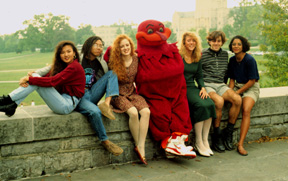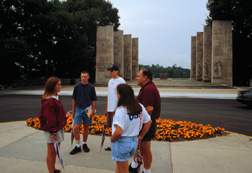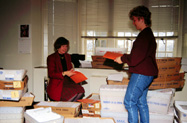
by Su Clauson-Wicker

Some of the nearly 19,000 students who applied to Virginia Tech this year were surprised to receive birthday cards sent by Kristiane Matthias (environmental science '98). These high-school students may also have received a friendly phone call from her, taken a campus tour she led, or met her at a college fair or high-school recruitment visit.
And while a birthday card or phone call may not lure someone to Tech, the personal contact with volunteers like Matthias can go a long way toward persuading high-school students that Virginia's largest university is not a cold, impersonal place. The enthusiasm of the student volunteers says Virginia Tech is a school they're proud of.
"I love this school," Matthias says. "My job is to pass on this excitement. For me, it's thrilling to see those faces [of prospective students] when they're looking at campus for the first time. I want to make it a positive experience." Matthias senses that prospective students prefer asking questions about campus life of her rather than the admissions-staff members. "I know what it's really like to live, eat, and go to school here now. They trust me," she says.
Matthias belongs to a carefully selected group of volunteers in the Recruiting Students Volunteer Program (RSVP) who send out invitations to visit campus, lead tours, visit high schools, and travel to college fairs to recruit the next year's class. They also send birthday cards to students who have been offered admission but haven't yet committed to Virginia Tech. RSVP and other innovative programs Tech uses to market itself are partially responsible for drawing increasing numbers of applicants in times when many other colleges and universities are seeing a decline.
In fact, 1996-97 has been one of the most selective admissions years yet, says Karen Torgersen (elementary education '78, MBA '86), interim director of the Office of Undergraduate Admissions. Almost 19,000 people applied for 5,400 freshman and transfer-student spots.
"We're definitely a school on the move," Torgersen says. "We're gaining a reputation nationally. We can't deny that our prominence in athletics has played a part in this. So have our Rhodes Scholar, our Nobel prize winner, our status as a nationally ranked research university, and the fact we were cited in Esquire, Business Week, and the Reader's Digest, among other publications."
The RSVP program and several others that allow applicants to interact with students or new graduates are the high-touch aspect of Virginia Tech's admissions' office. The other part is high-tech--having a spot on the multimedia CD-ROM placed by a national service in high schools, an admissions web page, and an interactive application process on the Internet.
"We definitely lead the pack in electronic marketing," Torgersen says. "We have to--we're Virginia Tech."
Last summer Virginia Tech became the first university to make it possible for students to fill out applications and pay their application fees electronically. So far, almost 1,000 students have applied to Virginia Tech without touching a piece of paper.
Virginia Tech's undergraduate admissions' homepage (http://www.admiss.vt.edu) was designed by students and features a video clip of the Blacksburg area, as well as application information, an application checklist, general admissions information, and a link to an online map of campus. Soon, public relations officer Kelly Queijo expects to make every admissions publication available online.
Even with advanced technological marketing, the admissions staff wouldn't think of neglecting the traditional face-to-face recruiting activities. Each year they travel thousands of miles to visit 730 high schools and 310 college fairs in 17 states, host six campus open houses, and give 10 on-campus information sessions per week, 52 weeks a year. They visit almost every public and private high school in the state, as well as many out-of-state secondary schools. Eight years ago, when Torgersen, then Tech's first associate admissions director in charge of out-of-state marketing, was wearing herself out driving the northeastern highways, she initiated the idea of "green deans."
"We hired a recent graduate part-time to help represent us at college fairs and high schools. She did so well that we expanded the program. Now we train five to seven green deans and put them on the road all fall. They do a great job," she says.
Although the admissions full-time staff continues to travel, they have noticed that many high-school students prefer talking to the recent graduates.
"I think we have an easier time developing rapport with them," says Vicki Garrison (communication studies and political science '96), who was a green dean last fall. "They see us as less threatening because we don't make admissions decisions."
Garrison says the experience helped improve her already strong public speaking skills "by about 150 times." Although she is qualified to work in higher-education admissions, Garrison says she is too loyal to Virginia Tech to feel right about recruiting students for another university.
"I really love Virginia Tech and feel I have been given opportunities here I couldn't have found anywhere else. Promoting Virginia Tech is something I really want to do well," she says.
Within days of Garrison's visit, students who filled out cards requesting more information about Tech received an invitation to visit campus, a chance to order a campus video, financial aid information, and a university-information brochure.
"We encourage them to visit campus," Torgersen says. "Once they see it, many of them are sold."
"I was," agrees Katie Gilbert of Fairfax, Va., who received her offer in January. "My uncles and grandfather went to Tech, so I knew a lot about it, but I was impressed with all the smiling faces I saw when I visited. The staff and the tour guide were so helpful that it didn't seem like a huge place anymore."

A record 20,530 students and parents visited campus in the past year, probably the result of spring mailings to 60,000 geographically and academically desirable students whose names Virginia Tech purchased from the College Board association.
Many students and parents visit during summer vacation or in early fall. Visitors don't need to make an appointment to join one of the walking tours of campus, conducted by RSVP student guides 17 times a week, Monday through Saturday, when classes are in session. They are held each weekday at 10 a.m., 11 a.m., and 1 p.m. and Saturdays at 11 a.m. and 1 p.m.
By tagging along with this group, you can find out any number of interesting things--for instance, that the campus bookstore is shaped like Virginia, that the combined dining halls offer 70 selections for each meal, and that the residence hall phones allow users to program calls to each person in a club, study group, or list of friends.
During the course of the year, the undergraduate admissions office receives almost 66,000 phone calls and 4,100 e-mail requests for information. The number of letters, applications, and transcripts the admissions office receives from students is staggering--especially for the mailman. In January, the peak month, their mail haul could fill up 16 standard-sized home mailboxes each day.
Not to be outdone, admissions mails 232,544 letters back. These include admission offers, of course--about 13,000 of them--and more than 4,700 rejection letters, and many requests for missing pieces of information. But the bulk of the mailings are directed to admitted students who haven't yet committed to Virginia Tech.
"We try to make sure they get a piece of mail from Virginia Tech every other week," Torgersen says. "We send out a letter from the president, a letter from the mayor of Blacksburg, a letter from the campus ministers' association, a letter from the placement office, and a letter from an RSVP student about the opportunities in technology at Virginia Tech. We give the kind of individual attention students get at a small school."
About 5,200 first-year and transfer students will decide to enter Tech in the fall, if the figures stack up the way they did last year. The mix will be about 25 percent out-of-state students and 75 percent Virginians. Many are from New York, New Jersey, Pennsylvania, and Maryland. "Students tend to go south to go to school," Torgersen says, "so we've positioned ourselves in the northern markets." Out-of-state students pay a $10,783 tuition (still a bargain in some northern states), while Virginians' cost is $4,231.

Virginia Tech has a fairly speedy admissions process, unlike many other colleges and universities where admissions decisions are made by a committee.
An admissions director checks applicants against standards set by the colleges and makes clear-cut admissions decisions on the spot. Well-qualified applicants usually receive their acceptances within two weeks, even when it means that the admissions staff works nights and weekends.
Journie Snell, of Harrisonburg, Va., came to campus in late October to investigate the five-year teaching master's program at the College of Human Resources and Education. She applied for early admission on the spot, and before Thanksgiving she knew she'd be spending her next five years in Blacksburg.
Former green dean Vicky Garrison is working in the admissions office's reception area for a few months while weaning herself from her beloved alma mater. Each time she sees the name of a visitor or acceptance from one of the schools she visited, she's excited.
"I know," she says, "that I had a part in helping them make the right decision."
Maybe your child, grandchild, neighbor, or paperboy will soon be one of the almost 19,000 students applying for admission to Virginia Tech. What do they need to become Hokies?
"The typical student admitted to Virginia Tech is a solid B+ student," says interim undergraduate admissions director Karen Torgersen. "SATs are important, but to a lesser degree than grades."
To be considered for admission, a student must complete:
18 units of high-school course work
4 units of English
3 units of math (includes Algebra I, Geometry, and Algebra II)
2 units of laboratory science (chosen from biology, chemistry or physics)
2 units of social science (one must be history)
Additional academic units (foreign language credit is highly recommended)
4 elective units
Some majors have other requirements, such as an additional year of advanced math or lab science. Most students who are selected for admission have completed more than the minimum requirements and have at least a 3.0 (B) grade point average.
Virginia Tech doesn't require essays or letters of recommendation, but there is a spot on the application for a personal statement. "This is where they can explain extenuating circumstances, such as an illness that might have brought down their grades, or list a special talent," Torgersen says.
Do you know a young person who is (or should be) interested in Virginia Tech?
You can help spread the word. To obtain informational materials, contact the Undergraduate Admissions Office at: Virginia Tech Admissions, 201 Burruss Hall, Blacksburg, VA 24061; phone: 540-231-6267; fax: 540-231-3242;e-mail: vtadmiss@vt.edu (for first-year students) or transfer@vt.edu (for transfer students)
A variety of recruitment materials, including applications, campus visit planners, information sheets on specific colleges and majors, and other materials are available. Admissions information is also available on the World Wide Web at http://www.admiss.vt.edu.
Alumni who are interested in becoming more involved in undergraduate recruiting through participation in the Alumni Admissions Council should contact Jacqueline Nottingham, assistant director of admissions, at (540) 231-3092, or by e-mail at ntnghm@vt.edu.
Alumni living overseas who are willing to recruit international students should contact Lee Drowne, at (540) 231-9339; fax (540) 231-3242; or by e-mail at drowne@vt.edu. She says alumni may be partially responsible for doubling the number of international undergraduates at Tech last fall.
Many alumni association chapters are involved in recruitment activities, as well as creating scholarships to support students from their locality at Virginia Tech. Assistant admissions director Nottingham sends chapters the names of students from their area who have been offered admission.
"Some chapters follow up by calling the students or sending them applications for the chapters scholarships," she says. "Others may plan a picnic for all new and returning Tech students from their area."
Other chapters, such as the Buffalo/Rochester, N.Y. group, represent Virginia Tech at college fairs that the university can't cover with paid staff.
Home | News | Features | Research | Philanthropy | President's Message | Athletics | Alumni | Classnotes | Editor's Page